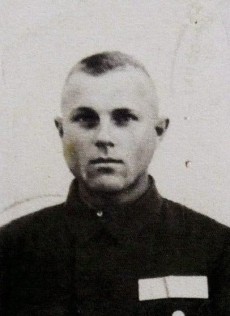In United States law, an Alford plea, also called a Kennedy plea in West Virginia, an Alford guilty plea, and the Alford doctrine, is a guilty plea in criminal court, whereby a defendant in a criminal case does not admit to the criminal act and asserts innocence, but accepts imposition of a sentence. This plea is allowed even if the evidence to be presented by the prosecution would be likely to persuade a judge or jury to find the defendant guilty beyond a reasonable doubt. This can be caused by circumstantial evidence and testimony favoring the prosecution, and difficulty finding evidence and witnesses that would aid the defense.
In law, a plea is a defendant's response to a criminal charge. A defendant may plead guilty or not guilty. Depending on jurisdiction, additional pleas may be available, including nolo contendere, no case to answer, or an Alford plea.

John Demjanjuk was a Ukrainian-American who served as a Trawniki man and Nazi camp guard at Sobibor extermination camp, Majdanek, and Flossenbürg. Demjanjuk became the center of global media attention in the 1980s, when he was tried and convicted in Israel after being misidentified as "Ivan the Terrible", a notoriously cruel watchman at Treblinka extermination camp. In 1993 the verdict was overturned. Shortly before his death, he was tried and convicted in the Federal Republic of Germany as an accessory to the 28,060 murders that occurred during his service at Sobibor.

Mark Fuhrman is a former detective of the Los Angeles Police Department (LAPD). He is primarily known for his part in the investigation of the 1994 murders of Nicole Brown Simpson and Ron Goldman in the O. J. Simpson murder case.

Lance Allan Ito is an American retired judge, best known for presiding over the criminal trial for the O. J. Simpson murder case, held in the Los Angeles County Superior Court in 1995.
Prejudice is a legal term with different meanings, which depend on whether it is used in criminal, civil, or common law. In legal context, prejudice differs from the more common use of the word and so the term has specific technical meanings.

Francis Lee Bailey Jr., better known to the general public as F. Lee Bailey, was an American criminal defense attorney. Bailey's name first came to nationwide attention for his involvement in the second murder trial of Sam Sheppard, a surgeon accused of murdering his wife. He later served as the attorney in a number of other high-profile cases, such as Albert DeSalvo, a suspect in the "Boston Strangler" murders, heiress Patty Hearst's trial for bank robberies committed during her involvement with the Symbionese Liberation Army, and US Army Captain Ernest Medina for the My Lai Massacre. He was a member of the "Dream Team" in the trial of former football player O. J. Simpson, who was accused of murdering Nicole Brown Simpson and Ron Goldman. He is considered one of the greatest lawyers of the 20th century.

Martha Elizabeth Moxley was a 15-year-old American high school student from Greenwich, Connecticut, who was murdered in 1975. Moxley was last seen alive spending time at the home of the Skakel family, across the street from her home in Belle Haven. Michael Skakel, also aged 15 at the time, was convicted in 2002 of murdering Moxley and was sentenced to 20 years to life in prison. In 2013, Skakel was granted a new trial by a Connecticut judge who ruled that his counsel had been inadequate, and he was released on $1.2 million bail. On December 30, 2016, the Connecticut Supreme Court ruled 4–3 to reinstate Skakel's conviction. The Connecticut Supreme Court reversed itself on May 4, 2018, and ordered a new trial. On October 30, 2020, the 45th anniversary of Moxley's murder, the state of Connecticut announced it would not retry Skakel for Moxley's murder. The case attracted worldwide publicity, as Skakel is a nephew of Ethel Skakel Kennedy, the widow of U.S. Senator Robert F. Kennedy.

Within the criminal justice system of Japan, there exist three basic features that characterize its operations. First, the institutions—police, government prosecutors' offices, courts, and correctional organs—maintain close and cooperative relations with each other, consulting frequently on how best to accomplish the shared goals of limiting and controlling crime. Second, citizens are encouraged to assist in maintaining public order, and they participate extensively in crime prevention campaigns, apprehension of suspects, and offender rehabilitation programs. Finally, officials who administer criminal justice are allowed considerable discretion in dealing with offenders.

The Criminal Justice Act 2003 is an Act of the Parliament of the United Kingdom. It is a wide-ranging measure introduced to modernise many areas of the criminal justice system in England and Wales and, to a lesser extent, in Scotland and Northern Ireland. Large portions of the act were repealed and replaced by the Sentencing Act 2020.

The People of the State of California v. Orenthal James Simpson was a criminal trial in Los Angeles County Superior Court, in which former National Football League (NFL) player and actor O. J. Simpson was tried and acquitted for the murders of his ex-wife Nicole Brown Simpson and her friend Ronald Goldman. The two were stabbed to death outside Brown's condominium in Los Angeles on June 12, 1994. The murder trial spanned eight months, from January 24 to October 3, 1995.
On May 22, 1995, 16-year-old Jimmy Farris, the son of a Los Angeles Police Department officer, was stabbed to death. Farris and his friend, Michael McLoren, were next to a clubhouse-type fort in McLoren's backyard. Four acquaintances of Farris and McLoren jumped the chainlink fence and approached the fort. There was a fight inside the fort. Farris and McLoren went into the house, bleeding from stab wounds, while the other four climbed back over the fence and left. Farris died before paramedics arrived. McLoren was airlifted to UCLA Medical Center.
The Double Jeopardy Clause of the Fifth Amendment to the United States Constitution provides: "[N]or shall any person be subject for the same offence to be twice put in jeopardy of life or limb..." The four essential protections included are prohibitions against, for the same offense:

Curtis Giovanni Flowers is an American man who was tried for murder six times in the U.S. state of Mississippi. Four of the trials resulted in convictions, all of which were overturned on appeal. Flowers was alleged to have committed the July 16, 1996, shooting deaths of four people inside Tardy Furniture store in Winona, seat of Montgomery County. Flowers was first convicted in 1997; in five of the six trials, the prosecutor, Montgomery County District Attorney Doug Evans, sought the death penalty against Flowers. As a result, Flowers was held on death row at the Parchman division of Mississippi State Penitentiary for over 20 years.

Michael Morton is an American who was wrongfully convicted in 1987 in a Williamson County, Texas court of the 1986 murder of his wife Christine Morton. He spent nearly 25 years in prison before he was exonerated by DNA evidence which supported his claim of innocence and pointed to the crime being committed by another individual. Morton was released from prison on October 4, 2011, and another man, Mark Alan Norwood, was convicted of the murder in 2013. The prosecutor in the case, Ken Anderson, was convicted of contempt of court for withholding evidence after the judge had ordered its release to the defense.

In court proceedings in the United States, a Perry Mason moment is said to have occurred whenever information is unexpectedly, and often dramatically, introduced into the record that changes the perception of the proceedings greatly and often influences the outcome. Often it takes the form of a witness's answer to a question, but it can sometimes come in the form of new evidence. It takes its name from Perry Mason, a fictional character in novels and stories written by Erle Stanley Gardner, where such dramatic reversals occurred, often in the form of witnesses confessing to crimes others were accused of in response to the sudden exposure of an inconsistency in their alibi.
Davis v. Ayala, 576 U.S. 257 (2015), was a case in which the Supreme Court of the United States upheld a death sentence of a Hispanic defendant despite the fact that all Blacks and Hispanics were rejected from the jury during the defendant's trial. The case involved a habeas corpus petition submitted by Hector Ayala, who was arrested and tried in the late 1980s for the alleged murder of three individuals during an attempted robbery of an automobile body shop in San Diego, California in April 1985. At trial, the prosecution used peremptory challenges to strike all Black and Hispanic jurors who were available for jury service. The trial court judge allowed the prosecution to explain the basis for the peremptory challenges outside the presence of Ayala's counsel, "so as not to disclose trial strategy". Ayala was ultimately sentenced to death, but he filed several appeals challenging the constitutionality of the trial court's decision to exclude his counsel from the hearings.

On Tuesday, October 3, 1995, the verdict in the O. J. Simpson murder case was announced and Simpson was acquitted on both counts of murder. Although the nation observed the same evidence presented at trial, a division along racial lines emerged in observers opinion of the verdict, which the media dubbed the "racial gap". Immediately following the trial, polling showed that most African Americans believed Simpson was innocent and justice had been served, while most White Americans felt he was guilty and the verdict was a racially motivated jury nullification by a mostly African-American jury. Current polling shows the gap has narrowed since the trial, with the majority of black respondents in 2016 stating they believed Simpson was guilty.
Chapman v. California, 386 U.S. 18 (1967), was a decision by the Supreme Court of the United States that a federal "harmless error" rule must apply, instead of equivalent state rules, for reviewing trials where federally-protected rights had been violated.

On October 4, 1982, Annette Cooper, 18, and Todd Schultz, 19, both of Logan, Ohio, and who were engaged to one another, went missing. Their dismembered bodies were recovered two weeks later in the Hocking River and a cornfield in West Logan. Both had been shot before being dismembered.












